
“The Government recognises that in many instances social service, community, iwi and Whānau Ora organisations are best placed to provide vital support to the communities impacted by COVID-19”.
That was the heartfelt statement from the Minister for Social Development Carmel Sepuloni on the 2nd March this year.
Although the 2021 Wellbeing Budget made no provision for Whānau Ora, that does not stop the vital work that whānau, hapū, iwi and Whānau Ora partners do every day to support the aspirations and opportunities for whānau to succeed.
Sector-specific advances are the big highlight items of Budget 2021:
-
1000 new homes for Maori through Vote Housing
-
$126 million for Hauora Māori programmes
-
$23 million in Vote Oranga Tamariki to help whānau in need
-
$1.5 billion allocated for the COVID-19 vaccine
-
Lifting weekly benefit rates by $20 from 1 July 2021
Yet the challenges of the Government’s 2018 Review of Whānau Ora – Tipu Matoro ki te Ao – still remain a significant challenge to progress in achieving holistic outcomes for whānau, by whānau, with whānau, about whānau. The recommendations to Government in 2018 were clear about the barriers to applying Whānau Ora:
-
The Terrace culture including a lack of trust in innovation and systematic racism;
-
The singular focus that agencies tend to take, characterised by a siloed approach to government service delivery
Te Pūtahitanga o Te Waipounamu is very aware of the dire situations for far too many whānau as they try to survive the impacts of a COVID-scarred environment. They suffer not just in inferior health outcomes, not just inadequate housing conditions, but in multiple and overlapping ways. In the last two months alone, the data gathered between 15 March 2021 to 14 May 2021 revealed a staggering 24,999 whānau members needed support to meet their needs for kai, for data, for power, for warmth.
Most of these whānau need help because they can’t meet their basic needs. Significant numbers have less family income and income uncertainty. Over one fifth have someone in their whānau who is sick or on medication.
“I’m a single parent, my youngest child is 12 and lives with me 50/50. I lost my job in October last year because of covid and am studying full time this year. We are just managing to scrape by (there will I’m sure be people who need help more) but our pantry is just getting emptier and emptier. We have been managing to survive on food parcels
“I got laid off my job last week then my 10-year-old daughter got put into my care waiting for my benefit to go in don’t have much food to feed my daughter and me please help”
“I have a wife and 3 kids and we are struggling to put food on our table”
Our PUNA hub reveals the adverse impacts of recession continue to be experienced in very raw and urgent ways. Between March and May of this year, the volume of calls taken for support just from PUNA was higher than the lockdown period last year:

We mihi to our 59+ Whānau Ora Partners; our 400+ Whānau Ora entities and our 126 Whānau Ora Navigators, who continue to back whānau; to believe in a strengths-based, outcome focused approach to addressing collective and community wellbeing.
We will continue to work hard to advocate for your work to be recognised in creating sustainable change. Your efforts are acknowledged by us all as being critical to both addressing the impact of COVID-19 during lockdown, but vitally in the months that have followed.
In an analysis of what Whānau Ora agencies were able to achieve during lockdown by Sacha McMeeking and Catherine Savage, it was clear that the way in which partners, providers, entities and whānau came together was instrumental in creating the change we needed, to keep whānau alive, strong, resilient and hopeful.
“This remarkable, and unanticipated, outcome is potentially a golden precedent for policymakers if we can determine the critical factors that reversed embedded trends of disproportionate disadvantage”.
We may not be in lockdown; but we see the difference being made every day by Navigators; by firewood distributors; by those working with supermarkets; by those in Te Pataka; Te Kaika; Te Kotahi o Te Tauihu; in marae; in homes and communities. It matters. It changes lives. And we are grateful for the extraordinary efforts.

Be Proud to be a Māori
While the Budget was read in Parliament on Thursday, a remarkable symposium was wrapping up in Wairau.
Created, managed and facilitated by Ngāti Apa ki te Rā Tō and Rangitāne o Wairau, the symposium, Te Kaiaotanga o Te Reo, was heard in te reo Māori, or if required, through a headset in which an interpretation of the reo was being heard.
Sir Timoti Karetu summed it up: “Be proud to be a Māori, and don’t think that your te reo Māori is of no use.”
The symposium was opened by Kiley Nēpia, pouahurea (cultural advisor) of Ngāti Apa ki te Rā Tō. Speakers for the symposium included Maori language champions Stacey and Scotty Morrison; and Human Rights Lawyer, Annette Sykes. We were proud to have two of our team attend: Hikairo Te Hae and Nathan Tau.
Taku Reo Rāhiri
The holistic support and positive guidance Whānau Ora Navigators provide is unparalleled. Having such a huge spectrum of support requirements and the nature of issues moving constantly up and down like the tide, Whānau Ora Navigators live true to their title in that they in navigate through both calm and stormy weather. Whānau speak consistently highly of their navigation experience.
“We know more about how to cope as a family. We have a safety plan that our navigator helped to create, we have been using the tools we have learnt to have more positive relationships between my partner and I, and we now give each other space when we need. Our home is finally violence free, and I feel safe to be in my home. I also now have my family as support, and we are no longer distant.”
In order to continue to live up to a practice model that sustains them, challenges them and centres them, Navigators have found enormous value in a key component of our professional development for this workforce: taku reo rāhiri. The objective of the programme is to provide training for sixteen Navigators from a bicultural lens that is grounded in matauranga Maori. These specifically aim to:
-
Kia whakamana te whānau and tautoko their wellbeing
-
Facilitate whānau mana
-
Increase Navigator confidence in their own mōhiotanga
-
Increase Navigator’s proficiency in guiding Whānau Ora.
The programme is delivered over four wananga. For the latest cohort, they had the privilege of having these wananga at Taumutu Marae; Rapaki; Onuku and ending at Koukourarata. There is an online component as well as group and individual kaitiaki sessions. And this time there was the stunning kai of Pip Tainui at each of the hui.
As the number of Whanau Ora navigators increase across Te Waipounamu, so too does the need to ensure that there is consistency in terms of building and developing skills and capability. The Taku Reo Rahiri programme is part of the road map to meet this key objective.
It is always a highlight and a rare privilege for me to spend time at the presentations of Taku Reo Rāhiri. I love it. Tania Riwai and Lewis Stephens from Ui Consultants are the two beautiful facilitators who coax and caress the courage and the strength from each of the Navigators to trust their peers in sharing their stories. We hear of pain and anguish, loss and learning, challenges that twist our thinking, memories that haunt the soul. But we also learn of love and belief; of faith-informed decisions. We cry and laugh at the same time; we gain understanding of behaviours; we sit in awe reflecting on the ways the heart is stretched beyond what one would think possible.
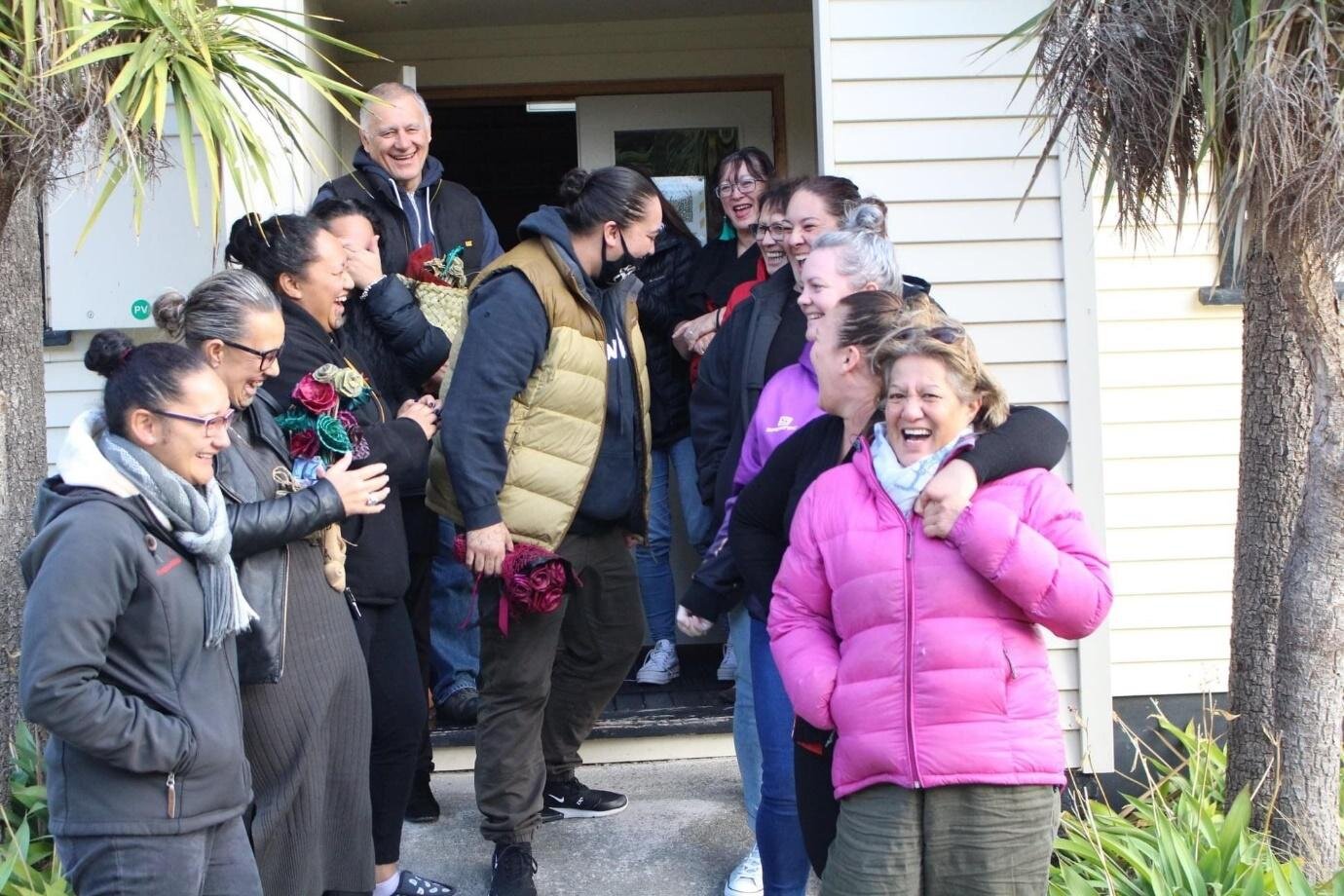
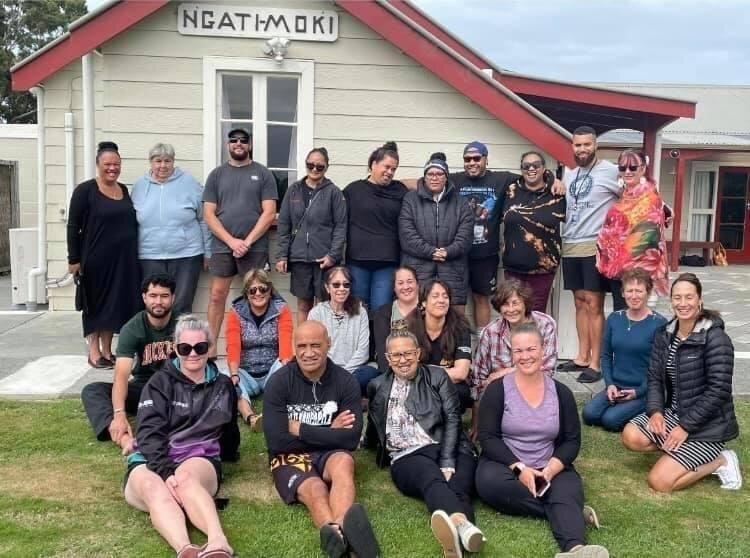
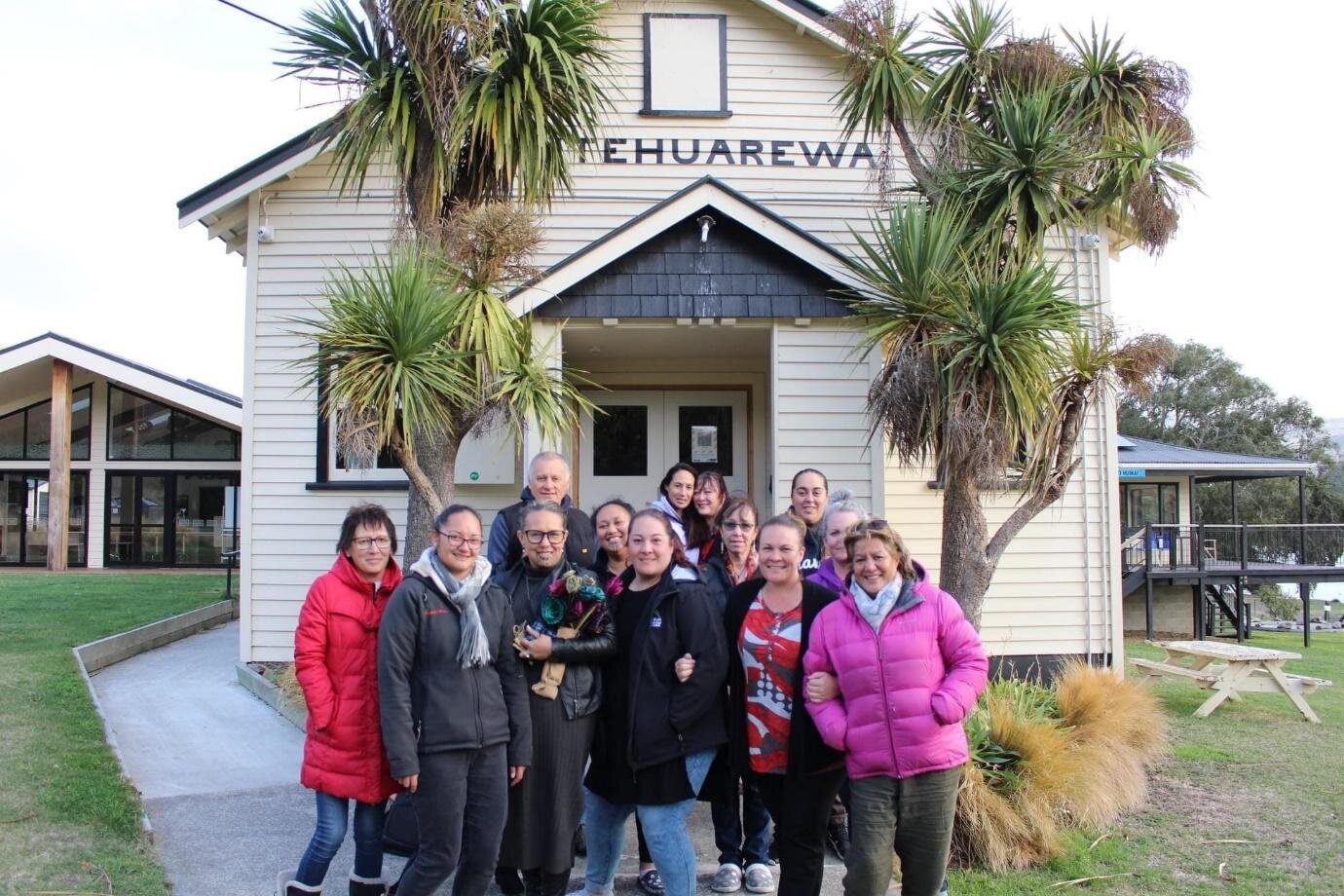
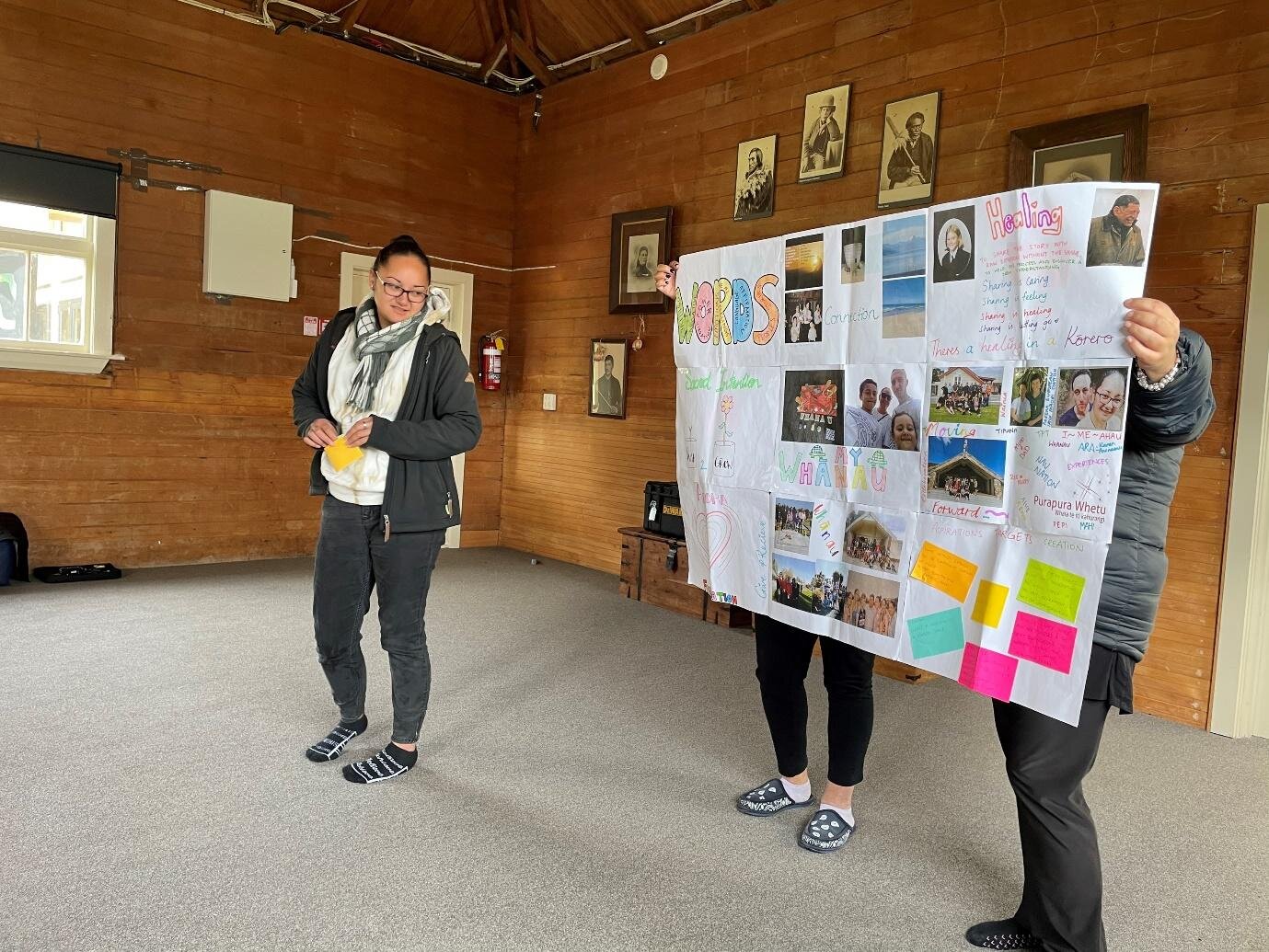
Kia Hiwa Rā….
We are accepting expressions of interest for the next intake to ARA – Level 4 Certificate in Health and Wellbeing.
This intake will be for 25 Whānau Ora Navigators only!
There is no financial cost to the Navigator and Partner agency other than a commitment of time. This course starts on the 2nd of August 2021 and concludes at the end of June 2022. There will be two wānanga with the rest of the course being delivered online. All classes, assignments, wānanga are compulsory. It is important that our Partners are aware of the level of study commitment involved and accordingly may allow their navigator to utilise a portion of their working hours as study.
What’s next?
We encourage navigator/s who would engage, benefit and take hold of this opportunity, to register their interest and/or queries to Leanna Pardoe and Rachael Haate.
leanna.pardoe@teputahitanga.org
Warrior Princess Workshops
I saw such a beautiful message this week from Timaru on social media that I had to share.
“Thank you ALL. Te Pūtahitanga o Te Waipounamu and te ataahua wahine of Warrior Princess Workshops for this beautiful and rewarding chance for our daughters. Our girl definitely had a meke time and has reconnected with her friends. A massive nga mihi team.”
Warrior Princess Workshops was formed in 2018 by registered social worker, Sofia Tuala. Sofia is passionate about supporting whānau break cycles of dysfunction and change their narrative for the next generation. This passion inspired Sofia to create Warrior Princess Workshops. Drawing from ten years experience of social and community work, she recognised a need for prevention work with girls and young women. The incorporated company was established in November 2019 after an initial investment from Te Pūtahitanga o Te Waipounamu.
Sofia facilitates all workshops with the help of a small team of female co-facilitators.
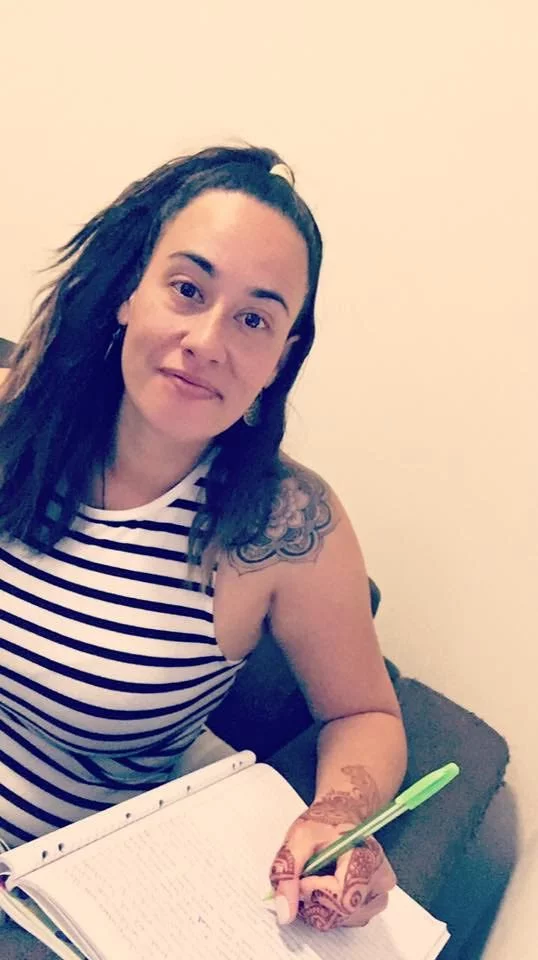

Executive Assistant to Pouārahi / GPL Board Secretariat
Te Pūtahitanga o Te Waipounamu
See the link below for more information:
https://www.seek.co.nz/job/52169240
Fixed term / Full time
Ōtautahi – Christchurch
Kia hiwa rā, kia hiwa rā, kei te kimi mātou o Te Pūtahitanga o Te Waipounamu i tētahi tāngata ki te whakakī i tētahi tūnga wātea. Nā reira, pānui mai i ngā kōrero e whai ake nei. Ko koe pea te tangata tika.
Mō mātou – Our Organisation
Te Pūtahitanga o Te Waipounamu is the Whānau Ora Commissioning Agency for the South Island. The commissioning agency model contributes to realising the power of Whānau Ora by developing strategies based on four guiding principles:
-
Kotahitanga – collaborative approach to integrated solutions and delivery
-
Kāinga focus – local solutions. Whānau initiated solutions are best.
-
Panoni hou – innovation through investing in new solutions, encouraging social innovation and entrepreneurship to incentivise new services, new approaches and integrated solutions.
-
Kōkiritanga – partnering for success.
Te Pūtahitanga o Te Waipounamu works to support and enable whānau to create sustained social impact. We do this by developing and investing in ideas and initiatives that improve outcomes for Māori, underpinned by whānau-centred principles and strategies.
Ko tā mātou mahi – our role
The primary focus of this full-time position is to provide seamless administrative and management support to the Pouārahi / Chief Executive of Te Pūtahitanga o Te Waipounamu and to be the Secretariat liaison for the GPL Board.
Responsibilities include:
-
Email and diary management
-
Responding to requests for speaking invitations
-
Briefing papers and preparation for meetings
-
Editing and formatting of documents
-
Coordination of meetings
-
Management and secretarial support to GPL
-
Calendar management of GPL and Te Taumata
-
Filing
-
Minute taking
-
Travel coordination for GPL, Taumata and Pouārahi / Chief Executive
-
Organising catering for meetings
-
Special projects and other ad hoc administrative and support duties.
Ōu pūkenga – What you will bring:
-
3-5 years of office administration at a senior administrative level
-
Advanced user of Word, PowerPoint, Excel and Outlook
-
Business writing skills
-
Strong awareness of and affinity for the needs and aspirations of whānau
-
Competency in Te Reo Māori me ōna tikanga and/or a willingness to develop further
-
Trust, reliability, and discretion
-
An effective communication style
-
Knowledge of the commissioning model and Whānau Ora and/or a willingness to learn
Ngā hua – Benefits/ What’s in it for you?
-
Passionate, motivated and caring colleagues
-
A workplace founded on te ao Māori and tikanga
-
A job that contributes to making a difference for whānau
-
Modern spacious office in central city location
-
Onsite parking
If you are an experienced Executive or Personal Assistant with excellent people skills, business acumen and an exemplary work ethic, we want to hear from you.
Me pēhea te tono – How to apply
Click apply now and attach your CV and a Cover Letter advising us why you would be an excellent fit for the role.
If you have any questions, or for a copy of the full Job description please contact hr@teputahitanga.org.
Applications close Sunday 23rd of May at 6pm.

Southern Māori businesses invited to enter biennial awards
Māori businesses in Otago, Southland and the Queenstown Lakes are being invited to enter a prestigious awards event that celebrates resilience, collaboration and business success.
Te Kupeka Umaka Māori ki Araiteuru (KUMA), the Māori business network for the Otago/Southland region, has today opened entries to the biennial KUMA Māori Business Awards.
Businesses that identify as Māori are eligible to enter. The categories for this year’s event are: Collaboration & Innovation, Employment & Growth, Resilience & Wellbeing and Emerging Enterprise (includes Rangatahi). The supreme winner will be awarded the Suzanne Spencer Tohu Maumahara Business Award.
Suzanne was highly regarded as one of the founding members of KUMA. This Award is an acknowledgement of her significant contribution to Māori ki Araiteuru and her enduring legacy.
After a year when people around the globe were asked to isolate, for many the past 12 months has provided opportunity to reinterpret that message, says KUMA Board co-Chair Claire Porima.
“What I have seen is the demonstration of kaupapa Māori entrepreneurship. We have focused on valuing our whānau connections, supporting each other personally and professionally, and creating innovative ways to strengthen our businesses. This is whakawhanaungatanga in action, one of our key values at KUMA. Our vision is captured in the whakatauki ‘Kia tipua tahi ai’, Let us grow together.”
An independent judging panel will select finalists, who will be acknowledged on the night alongside the category winners. Judges are: Experienced management consultant Jeffrey Broughton; Aimee Kaio, Rūnanga Engagement Manager in the Regional Investment Fund team of Te Rūnanga o Ngāi Tahu; and Karen Roos, Māori Enterprise Advisor from Te Puni Kōkiri.
The theme for this year’s awards is Manawaroa (resilience) and Kotahitanga (collaboration/oneness). The Awards dinner will take place at Elmwood Gardens in Invercargill, on July 2. Tickets are $100+GST for non-KUMA members, $60+GST for members and $500+GST for a table of 10. Entertainment and a guest speaker will be announced soon.
Entries close on Thursday, June 17. Entry forms can be downloaded here and are to be submitted to tautoko@kuma.co.nz.
ENDS
For more information, please contact
KUMA Board co-Chair Claire Porima:
E: claire@kuma.co.nz
P: 027 455 4575
About the KUMA 2021 Māori Business Awards judges
Jeffrey Broughton
Jeffrey Broughton (Kāti Huirapa ki Puketeraki) is an experienced management consultant and business adviser at Findex. He is passionate about helping Māori business owners improve their performance and grow their business.
Jeffrey is a chartered accountant and chartered member of the Institute of Directors with considerable experience in areas including strategy development, leadership and culture, innovation, advisory boards, organisational review and governance.
Aimee Kaio
Aimee Kaio (Kāi Tahu, Te Arawa, Ngā Puhi) is the Rūnanga Engagement Manager in the Regional Investment Fund team of Te Rūnanga o Ngāi Tahu. Aimee is a strong advocate for iwi-led regional economic development and is passionate about the growth of Māori SMEs.
Aimee is a part-owner of small businesses, an experienced board director and a habitual student (always learning). Aimee’s specialist skills and experience are in strategy development, ecosystem mapping, ideation, innovation and leadership.
Karen Roos
Karen Roos (Ngā Puhi) is a Māori Enterprise Advisor for Te Puni Kōkiri with 10 years’ experience supporting Māori SME owners. Karen is an advocate of increasing capability development so owners can reach their full potential – ultimately enhancing future business growth and supporting thriving whānau.
About KUMA
Te Kupeka Umaka Māori ki Araiteuru (KUMA) is the Māori business network for the Otago/Southland region. Established in 2005, its core purpose is to bring Māori business people together and enhance their individual success through collective support. Board members (voluntary roles), based throughout the region, are: in Ōtepoti Dunedin: Claire Porima and Janine Kapa (co-Chairs), Karen Roos, Joyce Lepper, Amber Bridgman, Katrina Bryant; in Waihōpai: Janice Lee; in Wānaka: Celia Crosbie; in Tāhuna Queenstown: Maria Rapata and Karmela Rapata; in Murihiku: RaNae Niven.


